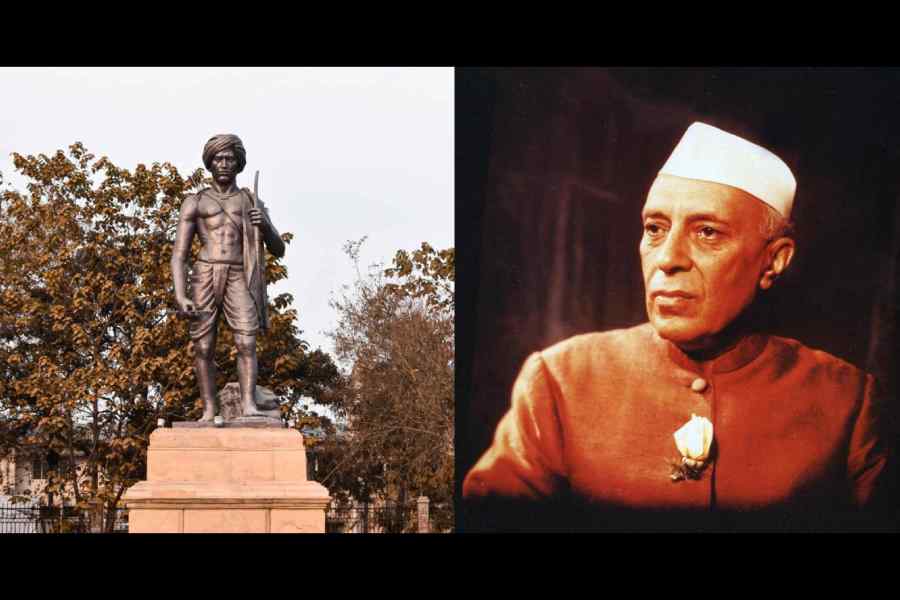Two birthdays over two days saw two markedly different responses from State authorities. Most governments were content in letting the 134th birth anniversary of Jawaharlal Nehru pass by unnoticed. A few small advertisements signalled a muted remembrance of India’s first prime minister.
A day later, on November 15, Bhagwan Birsa Munda’s 148th birth anniversary was celebrated with a flurry of public announcements on newspaper broadsheets. Celebrated since 2021 as ‘Janjatiya Gaurav Divas’, both the Government of India and the Jharkhand government declared a slew of new schemes and projects for the uplift of India’s tribal populations. Both appeared to be in competition in trying to claim the legacy of Birsa Munda as the champion of India’s tribes, the nation’s original inhabitants.
This difference between official celebrations on these two consecutive days neatly captures a turn in our orientation and politics. Birsa Munda was always a revered tribal leader, but never a national icon. His short life was marked by an intense spiritual phase during which he proclaimed himself to be the Dharti Aba (father of the earth) of his Munda tribesmen, followed by a political turn where he took up arms against the British. Both these phases were short-lived as he was arrested for breach of peace. Soon after, he died in prison. As a result of his all-too-brief period of political prominence, his impact was always localised to the Chhotanagpur plateau region; it never became part of the mainstream of the national movement. That mainstream was occupied by the Congress Party and its leaders at the vanguard of the freedom struggle.
The conspicuous emergence of Birsa Munda on the national stage today is attributable to a number of changed factors. At its narrowest, with the appointment of Droupadi Murmu as India's first president of tribal origin, tribal affairs are in the national spotlight anyway. Widen the lens and it is part of a move towards celebrating non-Congress leaders in the freedom movement. The renewed interest in Syama Prasad Mookerjee, Netaji Subhash Chandra Bose (partly of the Congress, though that’s not the part that’s celebrated) and B.R. Ambedkar are markers of this trend. Widen the lens even further and there is now a concerted effort to rediscover local heroes across time periods. The national celebration of the birth anniversary of Lachit Borphukan, a household name as a war hero in Assam but relatively unheard of in the rest of the country, the prominence given to Bhoja Paramara in Bhopal, admiringly described as Raja Bhoj, and making Kempegowda, the Vijayanagara chieftain apocryphally credited for establishing Bengaluru, a larger-than-life figure by building a massive statue outside the eponymous Bangalore airport, among other things, are part of a broader political project.
This project openly seeks to correct the perceived erasure of leaders from outside the Nehru-Gandhi pantheon in the history of India as a republic and a civilisation. For the Bharatiya Janata Party, this is good politics. Given that its history as a party begins after India attained independence and that claims of its forebears in the Rashtriya Swayamsevak Sangh participating actively in the freedom struggle have always invited scrutiny, shifting time periods is politically astute. It is also necessary to counter the charge of the BJP as a centralising party that is committed to unifying India through ‘One Nation, One Everything’. Celebrating local heroes on the national stage is a reflection of India’s diversity and the party’s willingness to embrace it.
But the appropriation of this diversity will be truly meaningful if it is both substantive and big-hearted. Commitment to India’s diversity cannot solely remain a symbolic gesture to local leaders from across the country. Lachit Borphukan was a successful military commander who defended his local territory against an assault from Delhi at the Battle of Saraighat in 1671. This was not only about a Hindu Ahom military commander taking on a Muslim Mughal leader in Delhi (the Mughal commander was a certain ‘Ram Singh’) but also about protecting a distinct local identity.
To preserve the legacy of Lachit will mean substantively respecting Assam’s distinctness, its linguistic pride that has consistently opposed the imposition of Hindi, its religious diversity — Lachit’s comrade-in-arms was Bagh Hazarika, born Ismail Siddiqui, another revered military leader — and its local deities, most notably Kamakhya, to whom meat and alcohol are part of the religious offering. Accepting this will require a catholicity of spirit. The same is true when it comes to tribal populations, whose distinct ways of life, particularly spiritual beliefs, eating habits, and family structures will have to be respected.
Equally, celebration of lesser-known histories does not need to come at the cost of more established ones. Many have the sense that the legacy of Nehru in building a modern nation-state is being sought to be slowly but surely dismantled. The cutting down of his birth anniversary celebrations, the digs at Nehruvian socialism, and the renaming of the Nehru Memorial Museum and Library in the heart of central Delhi to the Pradhanmantri Sangrahalaya have been viewed as evidence.
There is plenty of room in our hearts and in the nation’s consciousness to celebrate both Jawaharlal Nehru and Bhagwan Birsa Munda. Even when it comes to matters of tribal welfare, while of course it was Birsa Munda’s life’s work, for Nehru too, it was an article of faith.
This was repeatedly pointed out by Jaipal Singh Munda, the representative of the scheduled tribes in the Constituent Assembly. An accomplished sportsman who captained India’s hockey team in the 1928 Olympics, an Oxford blue, chairperson of the Adivasi Mahasabha, remembered today as ‘Marang Gomke’ — the Great Leader whose dream was a separate tribal state of Jharkhand — Jaipal reposed his faith in Nehru as the protector of India’s tribal populations. “I would entrust the future of every tribal people in this country, in the hands of Pandit Jawaharlal Nehru, and rather be not there myself,” he said on the floor of the Constituent Assembly on January 24, 1947.
Nehru came through, ensuring both reservation of seats for the scheduled tribes as well as protecting their autonomy through a range of constitutional measures. A confident and secure nation can celebrate this act of Nehruvian statesmanship while recognising the bravery of Birsa Munda at the same time. Their birthdays, either side of midnight, should be a testament to how joined at the hip they are.
Arghya Sengupta is Research Director, Vidhi Centre for Legal Policy. Views are personal










